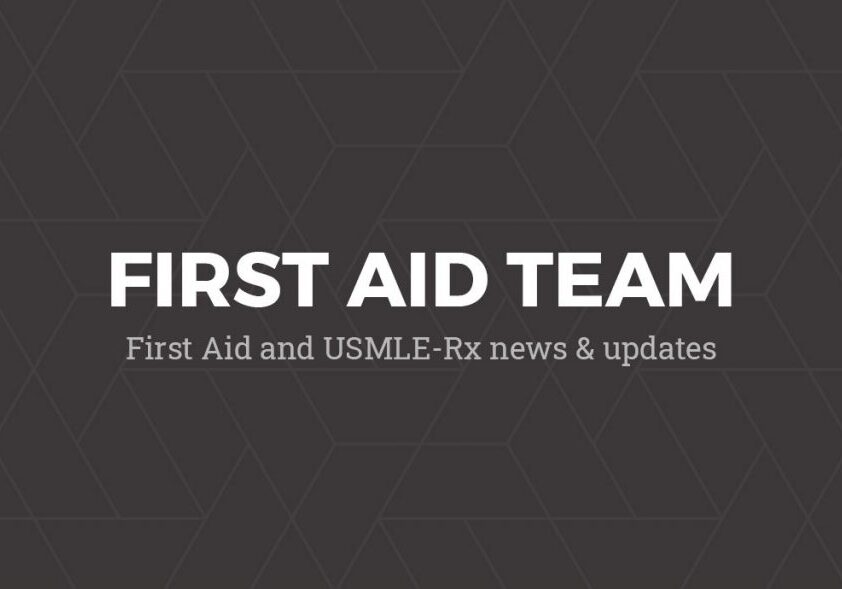The life of a med student can be overwhelming. From attending lectures to studying for exams, going to labs, and preparing to enter an uncertain work environment, it’s hard to stay on track and not feel buried in work. You can get through it though, and emerge ready to face any challenge.
When I first started med school, one of my biggest struggles was keeping my study materials organized so that I could keep up with my endless list of tasks. No one wants to spend valuable study time stringing together inefficient materials from multiple notebooks, documents, etc. To save time — not to mention frustration — and improve organization, I pooled all of my med school study tools in USMLE-Rx, a platform that fully integrates with First Aid for the USMLE Step 1.
How to Get the Best Out of Your Med School Study Tools
How do top medical students study? There’s no simple answer. Everyone has different knowledge, learning preferences, etc. That’s why a platform that houses everything in one spot is so valuable — it lets you customize a study plan that works best for you and saves time. No matter how you use it, here are some ways you can get the most out of USMLE-Rx and take your studying to the next level:
- Start studying early. This seems like an obvious strategy, but you’d be surprised by how hard it can be to get a head start on studying when the temptation to procrastinate is so real. But preparing for Step 1 and getting through med school is a marathon rather than a sprint. There’s a ton of information to learn, so you don’t want to wait until a month before an exam to buckle down.
- Create a schedule. Plan out your schedule according to your study goals, and then do whatever you can to stick to that schedule. A site for medical students, like USMLE-Rx, is helpful because it lets you easily keep track of what you’ve learned and stay on course.
- Deepen your knowledge. My biggest advice is this: During each Qmax question, be sure to read the explanations thoroughly — even if you think you already understand the topic. This is where my actual learning and understanding happens, and that might also be the case for you.
The Best Resources for Medical Students — in One Place
With the above tips in mind, you can start using USMLE-Rx efficiently to take some of the burden off of your shoulders.
One of the top medical student resources is an extensive Qbank. A good Qbank can be the difference between passing or failing the Step 1 exam, and research has shown a positive correlation between the number of practice questions you take and your Step 1 scores.
The USMLE-Rx Qbank, called Qmax, has more than 2,300 USMLE-type questions that are reviewed by experts. I’d argue that the most valuable aspect of Qmax is the explanations, which take you through every step of the questions. When I was having a hard time understanding how to differentiate between inhibitors in enzyme kinetics, the explanation in Qmax helped me see how to identify reversible competitive inhibitors, irreversible competitive inhibitors, and non-competitive inhibitors.
Qmax breaks concepts down with easy-to-understand explanations to help you truly master the content — not just memorize it — and apply it to real-world scenarios. And if you’re a visual learner like me, Qmax has detailed illustrations and charts to help you better grasp the concepts.
Another med school study tool that can be useful when preparing for Step 1 is digital flash cards. Anyone who has used these at some point can tell you how much of a pain it can be to fill in all of the information to create the cards. In USMLE-Rx, however, there are more than 15,000 ready-made flash cards, called Flash Facts, that correspond to USMLE Step 1 topics. Say goodbye to hours of copying and pasting your own flashcards or relying on decks that others have made from old editions of First Aid.
If you prefer to learn by watching videos, USMLE-Rx offers 1,300 Express Videos — one for each concept in First Aid. I know reading a review book can feel overwhelming and like you’re not absorbing the info, so having someone who understands the topic verbally explain it to you makes studying easier. And the videos are quick, breaking topics down into digestible nuggets.
Even better, most of the videos contain tips on how to remember complex topics or offer firsthand insights into how you might be tested on the information (since each video is presented by a senior student who’s already been through Step 1 and Step 2 CK). The tool also offers a downloadable workbook that you can use to follow along, which I find makes it easier to stay engaged.
Whether you’re a new med student getting started, an M2 in need of a refresher, or an IMG looking to recall the foundations of medicine, another valuable tool is Rx Bricks. These quick and interactive lessons are fully integrated with the other USMLE-Rx tools and First Aid. In my first year of med school, when I had no idea how to study and learn the tens of thousands of facts thrown at me, Rx Bricks helped me feel a little less overwhelmed.
All these tools are in one easy-to-use platform, called Rx360+, which I would argue is one of the best resources for medical students. The dashboard allows you to track your progress, so you don’t have to keep track of where you left off in your last study session. This also means you have easy access to your notes and highlights instead of having to flip through a dozen notebooks to find the structures of the diaphragm.
Study Smarter
There are quite a few sites for medical students to choose from when trying to perfect their study strategies. Take it from someone who’s tried probably every site out there — USMLE-Rx is one of the best resources for medical students I’ve ever seen. It helps me feel more organized, and it makes my study process easier (or as easy as it can be to memorize tons of information).
Med school is overwhelming enough without the struggle and time necessary to corral a seemingly endless number of study tools every time you want to prepare for an exam. With all your resources in one place, you can gain a little more peace of mind during an otherwise crazy time.
If you’re starting your med school journey and need help preparing for Step 1, click here to get a five-day free trial of USMLE-Rx.
Mark Heslin is an MS3 at Cooper Medical School at Rowan University. Mark is a member of USMLE-Rx’s Rx Coach team, serving as a tutor and resource for other med students.




